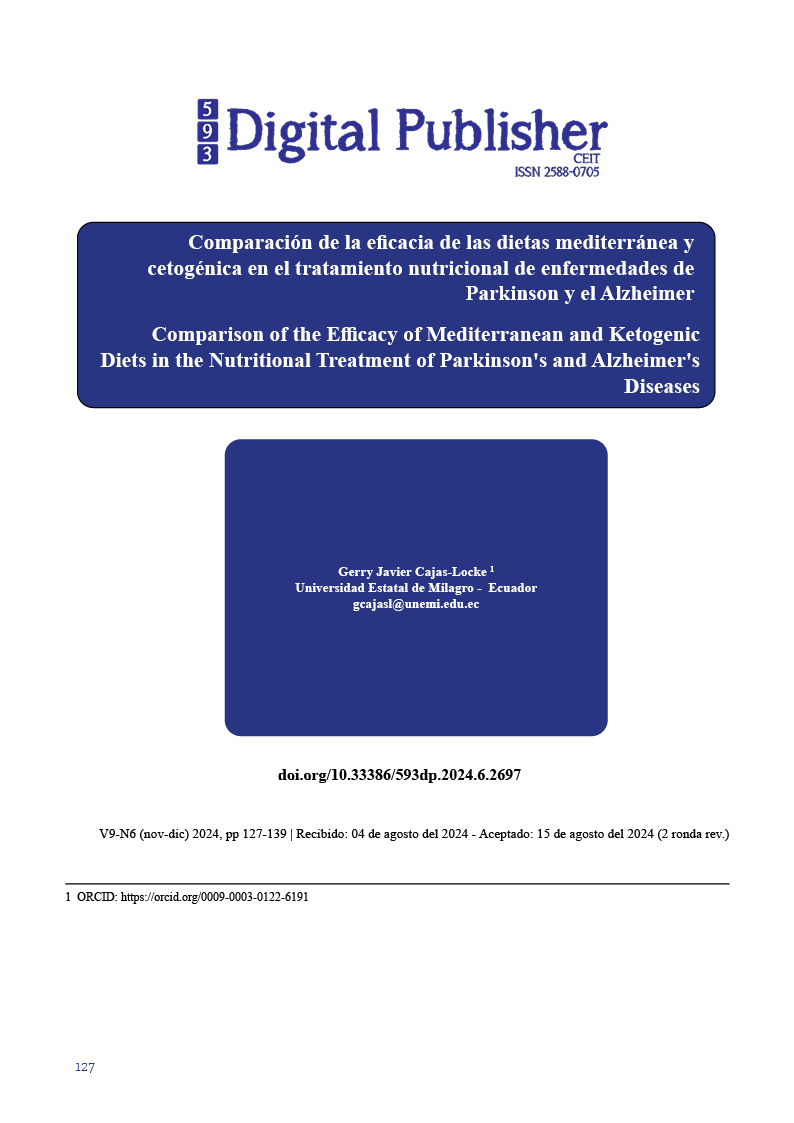Comparación de la eficacia de las dietas mediterránea y cetogénica en el tratamiento nutricional de enfermedades de Parkinson y el Alzheimer
Contenido principal del artículo
Resumen
Las enfermedades neurodegenerativas, como el Parkinson y el Alzheimer, representan un desafío significativo para la salud pública debido a su alta prevalencia y el impacto devastador en la calidad de vida de los pacientes. El objetivo del estudio fue comparar la eficacia de las dietas mediterránea y cetogénica en el tratamiento nutricional de las enfermedades de Parkinson y Alzheimer. La metodología, de enfoque cualitativo, utilizó una revisión sistemática siguiendo el método PRISMA para comparar los efectos de ambas dietas en el manejo de estas enfermedades. Se realizaron búsquedas exhaustivas en bases de datos científicas y se evaluó la calidad de los estudios seleccionados para asegurar resultados fiables y comparables. Los resultados revelan que la dieta mediterránea muestra una reducción en el riesgo de enfermedades neurodegenerativas y mejora en la función cognitiva, mientras que la dieta cetogénica destaca por su neuroprotección y mejora de síntomas motores y cognitivos. Ambos enfoques presentan mecanismos de acción únicos y desafíos en la adherencia y efectos secundarios. Se concluye que la dieta mediterránea y la cetogénica ofrecen beneficios distintos en la prevención y manejo de enfermedades neurodegenerativas; la mediterránea destaca por su alta adherencia y efectos positivos generales, mientras la cetogénica muestra beneficios específicos en neuroprotección y manejo de síntomas.
Descargas
Detalles del artículo

Esta obra está bajo una licencia internacional Creative Commons Atribución-NoComercial-CompartirIgual 4.0.
1. Derechos de autor
Las obras que se publican en 593 Digital Publisher CEIT están sujetas a los siguientes términos:
1.1. 593 Digital Publisher CEIT, conserva los derechos patrimoniales (copyright) de las obras publicadas, favorece y permite la reutilización de las mismas bajo la licencia Licencia Creative Commons 4.0 de Reconocimiento-NoComercial-CompartirIgual 4.0, por lo cual se pueden copiar, usar, difundir, transmitir y exponer públicamente, siempre que:
1.1.a. Se cite la autoría y fuente original de su publicación (revista, editorial, URL).
1.1.b. No se usen para fines comerciales u onerosos.
1.1.c. Se mencione la existencia y especificaciones de esta licencia de uso.
Citas
Alpuim Costa, D., Sampaio-Alves, M., Netto, E., Fernandez, G., Oliveira, E., Teixeira, A., Daniel, P. M., Bernardo, G. S., & Amaro, C. (2022). Hyperbaric Oxygen Therapy as a Complementary Treatment in Glioblastoma—A Scoping Review. Frontiers in Neurology, 13. https://doi.org/10.3389/fneur.2022.886603
Armeli, F., Bonucci, A., Maggi, E., Pinto, A., & Businaro, R. (2021). Mediterranean Diet and Neurodegenerative Diseases: The Neglected Role of Nutrition in the Modulation of the Endocannabinoid System. Biomolecules, 11(6), 790. https://doi.org/10.3390/biom11060790
Barbalace, M. C., Zallocco, L., Beghelli, D., Ronci, M., Scortichini, S., Digiacomo, M., Macchia, M., Mazzoni, M. R., Fiorini, D., Lucacchini, A., Hrelia, S., Giusti, L., & Angeloni, C. (2021). Antioxidant and Neuroprotective Activity of Extra Virgin Olive Oil Extracts Obtained from Quercetano Cultivar Trees Grown in Different Areas of the Tuscany Region (Italy). Antioxidants, 10(3), 421. https://doi.org/10.3390/antiox10030421
Barichella, M., Cereda, E., Cassani, E., Pinelli, G., Iorio, L., Ferri, V., Privitera, G., Pasqua, M., Valentino, A., Monajemi, F., Caronni, S., Lignola, C., Pusani, C., Bolliri, C., Faierman, S. A., Lubisco, A., Frazzitta, G., Petroni, M. L., & Pezzoli, G. (2017). Dietary habits and neurological features of Parkinson’s disease patients: Implications for practice. Clinical Nutrition, 36(4), 1054–1061. https://doi.org/10.1016/j.clnu.2016.06.020
Barichella, M., Cereda, E., & Pezzoli, G. (2009). Major nutritional issues in the management of Parkinson’s disease. Movement Disorders, 24(13), 1881–1892. https://doi.org/10.1002/mds.22705
Bloem, B. R., Okun, M. S., & Klein, C. (2021). Parkinson’s disease. The Lancet, 397(10291), 2284–2303. https://doi.org/10.1016/S0140-6736(21)00218-X
Businaro, R., Corsi, M., Asprino, R., Di Lorenzo, C., Laskin, D., Corbo, R. M., Ricci, S., & Pinto, A. (2018). Modulation of Inflammation as a Way of Delaying Alzheimer’s Disease Progression: The Diet’s Role. Current Alzheimer Research, 15(4), 363–380. https://doi.org/10.2174/1567205014666170829100100
Cereda, E., Barichella, M., Pedrolli, C., Klersy, C., Cassani, E., Caccialanza, R., & Pezzoli, G. (2011). Diabetes and Risk of Parkinson’s Disease. Diabetes Care, 34(12), 2614–2623. https://doi.org/10.2337/dc11-1584
Coelho-Júnior, H. J., Trichopoulou, A., & Panza, F. (2021). Cross-sectional and longitudinal associations between adherence to Mediterranean diet with physical performance and cognitive function in older adults: A systematic review and meta-analysis. Ageing Research Reviews, 70, 101395. https://doi.org/10.1016/j.arr.2021.101395
de la Rubia Ortí, J. E., Fernández, D., Platero, F., & García-Pardo, M. P. (2021). Can Ketogenic Diet Improve Alzheimer’s Disease? Association With Anxiety, Depression, and Glutamate System. Frontiers in Nutrition, 8. https://doi.org/10.3389/fnut.2021.744398
Farooqui, A. A., & Farooqui, T. (2018). Effects of Mediterranean Diet Components on Neurodegenerative Diseases. In Role of the Mediterranean Diet in the Brain and Neurodegenerative Diseases (pp. 1–16). Elsevier. https://doi.org/10.1016/B978-0-12-811959-4.00001-8
Féart, C. (2009). Adherence to a Mediterranean Diet, Cognitive Decline, and Risk of Dementia. JAMA, 302(6), 638. https://doi.org/10.1001/jama.2009.1146
Ferraris, C., Guglielmetti, M., Tamagni, E., Trentani, C., De Giorgis, V., Pasca, L., Varesio, C., Ferraro, O. E., & Tagliabue, A. (2020). Use of Remote Monitoring by E-mail for Long-Term Management of the Classic Ketogenic Diet. Nutrients, 12(6), 1833. https://doi.org/10.3390/nu12061833
Franco, G. A., Interdonato, L., Cordaro, M., Cuzzocrea, S., & Di Paola, R. (2023). Bioactive Compounds of the Mediterranean Diet as Nutritional Support to Fight Neurodegenerative Disease. International Journal of Molecular Sciences, 24(8), 7318. https://doi.org/10.3390/ijms24087318
García-Casares, N., Gallego Fuentes, P., Barbancho, M. Á., López-Gigosos, R., García-Rodríguez, A., & Gutiérrez-Bedmar, M. (2021). Alzheimer’s Disease, Mild Cognitive Impairment and Mediterranean Diet. A Systematic Review and Dose-Response Meta-Analysis. Journal of Clinical Medicine, 10(20), 4642. https://doi.org/10.3390/jcm10204642
Greco, T., Glenn, T. C., Hovda, D. A., & Prins, M. L. (2016). Ketogenic diet decreases oxidative stress and improves mitochondrial respiratory complex activity. Journal of Cerebral Blood Flow & Metabolism, 36(9), 1603–1613. https://doi.org/10.1177/0271678X15610584
Gupta, L., Khandelwal, D., Kalra, S., Gupta, P., Dutta, D., & Aggarwal, S. (2017). Ketogenic diet in endocrine disorders. Journal of Postgraduate Medicine, 63(4), 242–251. https://doi.org/10.4103/jpgm.JPGM_16_17
Hargreaves, S. M., Raposo, A., Saraiva, A., & Zandonadi, R. P. (2021). Vegetarian Diet: An Overview through the Perspective of Quality of Life Domains. International Journal of Environmental Research and Public Health, 18(8), 4067. https://doi.org/10.3390/ijerph18084067
Hill, E., Goodwill, A. M., Gorelik, A., & Szoeke, C. (2019). Diet and biomarkers of Alzheimer’s disease: a systematic review and meta-analysis. Neurobiology of Aging, 76, 45–52. https://doi.org/10.1016/j.neurobiolaging.2018.12.008
Jensen, N. J., Wodschow, H. Z., Nilsson, M., & Rungby, J. (2020). Effects of Ketone Bodies on Brain Metabolism and Function in Neurodegenerative Diseases. International Journal of Molecular Sciences, 21(22), 8767. https://doi.org/10.3390/ijms21228767
Jiang, Z., Yin, X., Wang, M., Chen, T., Wang, Y., Gao, Z., & Wang, Z. (2022). Effects of Ketogenic Diet on Neuroinflammation in Neurodegenerative Diseases. Aging and Disease, 13(4), 1146. https://doi.org/10.14336/AD.2021.1217
Klockgether, T. (2004). Parkinson?s disease: clinical aspects. Cell and Tissue Research, 318(1), 115–120. https://doi.org/10.1007/s00441-004-0975-6
Koppel, S. J., & Swerdlow, R. H. (2018). Neuroketotherapeutics: A modern review of a century-old therapy. Neurochemistry International, 117, 114–125. https://doi.org/10.1016/j.neuint.2017.05.019
Krikorian, R., Shidler, M. D., Dangelo, K., Couch, S. C., Benoit, S. C., & Clegg, D. J. (2012). Dietary ketosis enhances memory in mild cognitive impairment. Neurobiology of Aging, 33(2), 425.e19-425.e27. https://doi.org/10.1016/j.neurobiolaging.2010.10.006
Lang, A. E., & Espay, A. J. (2018). Disease Modification in Parkinson’s Disease: Current Approaches, Challenges, and Future Considerations. Movement Disorders, 33(5), 660–677. https://doi.org/10.1002/mds.27360
Liyanage, T., Ninomiya, T., Wang, A., Neal, B., Jun, M., Wong, M. G., Jardine, M., Hillis, G. S., & Perkovic, V. (2016). Effects of the Mediterranean Diet on Cardiovascular Outcomes—A Systematic Review and Meta-Analysis. Plos One, 11(8), e0159252. https://doi.org/10.1371/journal.pone.0159252
Maraki, M. I., Yannakoulia, M., Xiromerisiou, G., Stefanis, L., Charisis, S., Giagkou, N., Kosmidis, M. H., Dardiotis, E., Hadjigeorgiou, G. M., Sakka, P., Scarmeas, N., & Stamelou, M. (2023). Mediterranean diet is associated with a lower probability of prodromal Parkinson’s disease and risk for Parkinson’s disease/dementia with Lewy bodies: A longitudinal study. European Journal of Neurology, 30(4), 934–942. https://doi.org/10.1111/ene.15698
Mazon, J. N., de Mello, A. H., Ferreira, G. K., & Rezin, G. T. (2017). The impact of obesity on neurodegenerative diseases. Life Sciences, 182, 22–28. https://doi.org/10.1016/j.lfs.2017.06.002
Mochamat, Cuhls, H., Sellin, J., Conrad, R., Radbruch, L., & Mücke, M. (2021). Fatigue in advanced disease associated with palliative care: A systematic review of non-pharmacological treatments. Palliative Medicine, 35(4), 697–709. https://doi.org/10.1177/02692163211000628
Nelson, L., & Tabet, N. (2015). Slowing the progression of Alzheimer’s disease; what works? Ageing Research Reviews, 23, 193–209. https://doi.org/10.1016/j.arr.2015.07.002
Pauwels, E. K. J. (2011). The Protective Effect of the Mediterranean Diet: Focus on Cancer and Cardiovascular Risk. Medical Principles and Practice, 20(2), 103–111. https://doi.org/10.1159/000321197
Pavón, S., Lázaro, E., Martínez, O., Amayra, I., López-Paz, J. F., Caballero, P., Al-Rashaida, M., Luna, P. M., García, M., Pérez, M., Berrocoso, S., Rodríguez, A. A., & Pérez-Núñez, P. (2021). Ketogenic diet and cognition in neurological diseases: a systematic review. Nutrition Reviews, 79(7), 802–813. https://doi.org/10.1093/nutrit/nuaa113
Petersson, S. D., & Philippou, E. (2016). Mediterranean Diet, Cognitive Function, and Dementia: A Systematic Review of the Evidence. Advances in Nutrition, 7(5), 889–904. https://doi.org/10.3945/an.116.012138
Petrella, C., Di Certo, M. G., Gabanella, F., Barbato, C., Ceci, F. M., Greco, A., Ralli, M., Polimeni, A., Angeloni, A., Severini, C., Vitali, M., Ferraguti, G., Ceccanti, M., Lucarelli, M., Severi, C., & Fiore, M. (2021). Mediterranean Diet, Brain and Muscle: Olive Polyphenols and Resveratrol Protection in Neurodegenerative and Neuromuscular Disorders. Current Medicinal Chemistry, 28(37), 7595–7613. https://doi.org/10.2174/0929867328666210504113445
Phillips, M. C. L., Deprez, L. M., Mortimer, G. M. N., Murtagh, D. K. J., McCoy, S., Mylchreest, R., Gilbertson, L. J., Clark, K. M., Simpson, P. V., McManus, E. J., Oh, J.-E., Yadavaraj, S., King, V. M., Pillai, A., Romero-Ferrando, B., Brinkhuis, M., Copeland, B. M., Samad, S., Liao, S., & Schepel, J. A. C. (2021). Randomized crossover trial of a modified ketogenic diet in Alzheimer’s disease. Alzheimer’s Research & Therapy, 13(1), 51. https://doi.org/10.1186/s13195-021-00783-x
Salas-Salvadó, J., & Papandreou, C. (2020). The Mediterranean diet: History, concepts and elements. In The Mediterranean Diet (pp. 3–11). Elsevier. https://doi.org/10.1016/B978-0-12-818649-7.00001-1
Saleh, R. N. M., & Minihane, A. M. (2022). Fish, n-3 fatty acids, cognition and dementia risk: not just a fishy tale. Proceedings of the Nutrition Society, 81(1), 27–40. https://doi.org/10.1017/S0029665121003700
Scarmeas, N., Stern, Y., Tang, M., Mayeux, R., & Luchsinger, J. A. (2006). Mediterranean diet and risk for Alzheimer’s disease. Annals of Neurology, 59(6), 912–921. https://doi.org/10.1002/ana.20854
Selmin, O. I., Romagnolo, A. P. G., & Romagnolo, D. F. (2016). Mediterranean Diet and Neurodegenerative Diseases. In Mediterranean Diet (pp. 153–164). Springer International Publishing. https://doi.org/10.1007/978-3-319-27969-5_12
Shannon, O. M., Mendes, I., KÖchl, C., Mazidi, M., Ashor, A. W., Rubele, S., Minihane, A.-M., Mathers, J. C., & Siervo, M. (2020). Mediterranean Diet Increases Endothelial Function in Adults: A Systematic Review and Meta-Analysis of Randomized Controlled Trials. The Journal of Nutrition, 150(5), 1151–1159. https://doi.org/10.1093/jn/nxaa002
Sridharan, B., & Lee, M.-J. (2022). Ketogenic Diet: A Promising Neuroprotective Composition for Managing Alzheimer’s Diseases and its Pathological Mechanisms. Current Molecular Medicine, 22(7), 640–656. https://doi.org/10.2174/1566524021666211004104703
Taylor, M. K., Sullivan, D. K., Mahnken, J. D., Burns, J. M., & Swerdlow, R. H. (2018). Feasibility and efficacy data from a ketogenic diet intervention in Alzheimer’s disease. Alzheimer’s & Dementia: Translational Research & Clinical Interventions, 4(1), 28–36. https://doi.org/10.1016/j.trci.2017.11.002
Turk, D. C., & McCarberg, B. (2005). Non-Pharmacological Treatments for Chronic Pain. Disease Management & Health Outcomes, 13(1), 19–30. https://doi.org/10.2165/00115677-200513010-00003
Ye, R., Cheng, Y., Ge, Y., Xu, G., & Tu, W. (2023). A bibliometric analysis of the global trends and hotspots for the ketogenic diet based on CiteSpace. Medicine, 102(5), e32794. https://doi.org/10.1097/MD.0000000000032794
Yin, X., Qiu, Y., Zhao, C., Zhou, Z., Bao, J., & Qian, W. (2021). The Role of Amyloid-Beta and Tau in the Early Pathogenesis of Alzheimer’s Disease. Medical Science Monitor, 27. https://doi.org/10.12659/MSM.933084
Zahra, W., Rai, S. N., Birla, H., Singh, S. Sen, Dilnashin, H., Rathore, A. S., & Singh, S. P. (2020). The Global Economic Impact of Neurodegenerative Diseases: Opportunities and Challenges. In Bioeconomy for Sustainable Development (pp. 333–345). Springer Singapore. https://doi.org/10.1007/978-981-13-9431-7_17
Zvěřová, M. (2019). Clinical aspects of Alzheimer’s disease. Clinical Biochemistry, 72, 3–6. https://doi.org/10.1016/j.clinbiochem.2019.04.015


